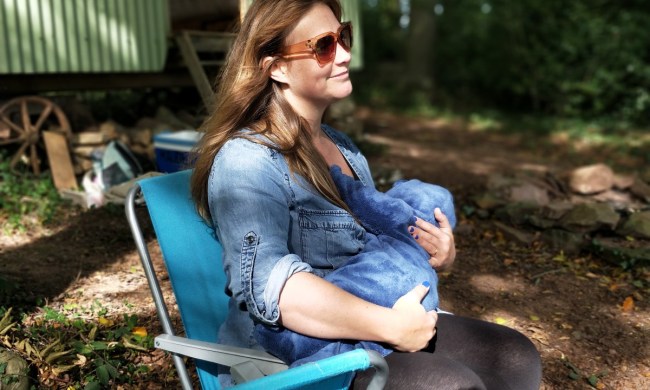Breastfeeding parents have to be just as diligent about the medications they take as they were when they were pregnant. It can be a little confusing for any parent to know what’s safe to take while breastfeeding, especially when a particularly bad case of the flu hits or they pick up a nasty virus. If this happens and you’re breastfeeding, you’re surely eager to find something that will help you feel better.
Sometimes, nursing moms need cold medicine. Theraflu is a safe medication for common flu symptoms like low fever, cough, runny nose, and muscle soreness, however, if you’re breastfeeding you should take caution when taking Theraflu. Let’s discuss the reasons why.

What is in Theraflu?
Theraflu is available in various formulas. Different packets treat specific symptoms, though most folks take the multi-symptom product for colds, coughs, runny noses, and fevers. We’ll focus on this multi-symptom brew.
Theraflu is a combination of three ingredients:
- Acetaminophen relieves pain.
- Dextromethorphan helps calm down coughs.
- Phenylephrine clears out sinuses.
Mix the packet into a cup of hot water and you’ve got a potent drink to make you feel better. But is it safe for breastfeeding mamas? Acetaminophen is a common pain reliever, and doctors regularly prescribe it to patients, including new moms. It’s the medicine found in other pain reliever brands like Tylenol.
Dextromethorphan relaxes your brain and muscles, eliminating the persistent need to cough. It’ll calm down your cough for a while but doesn’t really help stop it. It just lets you sleep better for the most part. Phenylephrine helps clear out a stuffy nose by helping reduce swelling in your sinuses. It’s commonly used in allergy medication.

What are the potential side effects of Theraflu?
Medication, food, and nutrients can pass through breast milk to your little one, so double-checking Theraflu’s safety is a good idea. There isn’t a lot of research on the effects of flu medication on breastfeeding women purely based on ethical reasons. After all, it would be improper and downright dangerous to test drugs on moms who breastfeed their children.
Nevertheless, there is data extracted from voluntary studies and surveys. Since acetaminophen is such a common medication, it poses little risk to your little one when you take it while breastfeeding. Some infants have also been prescribed acetaminophen, and this prescribed dose is much more than what they would get from your breast milk.
The other two ingredients are where it gets a little tricky. Dextromethorphan is a relaxant and sedative. This means taking high doses might make your little one drowsy, as well. It differs between moms, but it could also mean a dip in your milk supply.
Phenylephrine can also reduce your milk supply while taking Theraflu. However, it seems the effects go away in a few days. Keep in mind that decongestants can make their way into your breast milk and make your little one sleepier than usual.

Do I have to stop breastfeeding if I get the flu?
No one likes getting sick, but when you’re breastfeeding, it can be even more frustrating, especially if you’re concerned about getting your baby sick. Fortunately, the CDC notes that breastfeeding is not only safe but encouraged if the mother gets the flu. The natural antibodies contained in the breast milk will help keep the baby healthy and protect the baby from contracting the flu.
However, if the mom is simply too sick to breastfeed, they can always pump so someone else can feel the baby. It isn’t uncommon for illnesses like the flu to impact milk production, so supplementing with formula may be necessary during this time.

How often are you taking Theraflu, and how often do you feed your child?
Taking the side effects into consideration, it might be safe to take Theraflu just once or very infrequently to reduce uncomfortable symptoms. After all, your baby will do much better when you feel better. In addition to your dosage frequency, consider what your baby’s feeding schedule is like.
Try to take a dose only right after you breastfeed. Wait at least two hours (if possible) before breastfeeding again. You might also take a dose at night when your little one is more likely to skip a feeding or eat less. This will help reduce any side effects like drowsiness or irritability.
But the truth? There simply isn’t enough hard, statistical evidence to say whether Theraflu is absolutely safe for breastfeeding moms and their babies. Even Theraflu has a disclaimer on each product and its website, asking nursing moms to consult with their physicians first before taking it.
With that said, let’s take a look at what other choices we have besides flu medication.

What other medications or natural remedies can I take?
Experts say topical decongestants like nasal sprays are less likely to make their way into breast milk. You might also try putting a towel over your head and breathing in steam from a freshly boiled pot of water. Beyond that, take a hot, steamy shower and see if it helps reduce congestion.
For coughs, drink lots of water and decaf tea with honey, lemon, and ginger. Pediatricians recommend flu medications with oseltamivir, which is certified safe for nursing moms by the Centers for Disease Control and Prevention. Take acetaminophen for any pains, fevers, or aches.

Can I take Emergen-C while breastfeeding?
Being sick is awful, but being sick while pregnant or breastfeeding is truly the worst because you have to be so careful about what medicine you can take to feel better. It’s understandable then, that you may want to be as proactive as possible about your health and do everything you can to avoid getting sick. Emergen-C is a popular supplement that provides you with 1,000 mg of vitamin C, which is more than 10 oranges worth.
Healthline notes that those who are breastfeeding can safely consume 1,000 mg of vitamin C a day without any adverse effects, making Emergen-C safe to take while breastfeeding. It does note that it could cause an increase in milk supply, which could be good or bad, depending on your individual situation.
When taking Theraflu while breastfeeding, there seems to be little risk to your baby. If possible, take only a single dose and try other alternatives before resorting to the multi-symptom packet. But what’s the best thing you can do besides medication? Whenever possible, rest, rest, rest! We know it’s tough getting a busy mom to take a break, but in this case, it’s OK to relax. Moreover, if you need information regarding NyQuil remedies, check our guide on everything you need to know about NyQuil and nursing.




